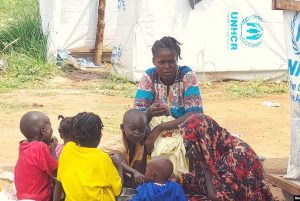Source: www.morningstarnews.org
Date: December 18, 2024
Muslim stabbed her in refugee camp in South Sudan.
By Our Sudan Correspondent

Sudanese family at Gorom Refugee Settlement in South Sudan in July 2023. (Manyang David Mayar, VOA)
JUBA, South Sudan (Morning Star News) – A Sudanese refugee in South Sudan who suffered a knife attack by her Muslim husband four months ago for converting to Christianity faces daily pressure to renounce her faith, sources said.
Halima Mohammed Ali, a mother of five children ranging in age from 1.5 to 14, has remained with her family at Gorom Refugee Settlement about 25 kilometers (15 miles) west of Juba, capital of South Sudan. She had left her home following the stabbing blow to her head in September but returned after one month, she said.
“I left him shortly after [the attack] but returned after a month to take care of the kids, though he still threatens me, that I return to Islam,” Ali told Morning Star News. “But I refuse.”
She put her faith in Christ in June and attended discipleship classes at a church in the refugee camp, but after she began attending worship services a few months later, her husband on the night of Sept. 8 stabbed her on the right side of her head, causing a moderate injury, she said.
Her husband’s Muslim relatives have pressured him to drive her away, telling him, “We cannot stay with a Christian woman,” according to Ali.
She has refused to renounce her faith and continues attending church services, a Christian leader said.
“She asks for prayers to remain firm in her faith,” he said, adding that he and Ali hope making her story public will deter her husband from further attacks.
Christians of Sudan are being targeted on religious lines by both the Muslim community and state actors under a notorious “foreign faces law” that allows the military to arrest any person suspected of being a stranger in a given town.
Ali and her family fled the war in Sudan in May 2023, joining more than 10,000 other refugees at the Gorom settlement. Fighting in Sudan between the paramilitary Rapid Support Forces (RSF) and the Sudanese Armed Forces (SAF) broke out on April 15, 2023.
The conflict between the RSF and the SAF, which had shared military rule in Sudan following an October 2021 coup, has terrorized civilians in Khartoum and elsewhere, killing tens of thousands and displacing 12.2 million people within and beyond Sudan’ borders, according to the U.N. Commissioner for Human Rights (UNCHR).
The SAF’s Gen. Abdelfattah al-Burhan and his then-vice president, RSF leader Mohamed Hamdan Dagalo, were in power when civilian parties in March 2023 agreed on a framework to re-establish a democratic transition the next month, but disagreements over military structure torpedoed final approval.
Burhan sought to place the RSF – a paramilitary outfit with roots in the Janjaweed militias that had helped former strongman Omar al-Bashir put down rebels – under the regular army’s control within two years, while Dagolo would accept integration within nothing fewer than 10 years.
Both military leaders have Islamist backgrounds while trying to portray themselves to the international community as pro-democracy advocates of religious freedom.
Christian sites have been targeted since the conflict began.
In Open Doors’ 2024 World Watch List of the countries where it is most difficult to be a Christian, Sudan was ranked No. 8, up from No. 10 the previous year, as attacks by non-state actors continued and religious freedom reforms at the national level were not enacted locally.
Sudan had dropped out of the top 10 for the first time in six years when it first ranked No. 13 in the 2021 World Watch List.
Following two years of advances in religious freedom in Sudan after the end of the Islamist dictatorship under Bashir in 2019, the specter of state-sponsored persecution returned with the military coup of Oct. 25, 2021. After Bashir was ousted from 30 years of power in April 2019, the transitional civilian-military government had managed to undo some sharia (Islamic law) provisions. It outlawed the labeling of any religious group “infidels” and thus effectively rescinded apostasy laws that made leaving Islam punishable by death.
With the Oct. 25, 2021 coup, Christians in Sudan feared the return of the most repressive and harsh aspects of Islamic law. Abdalla Hamdok, who had led a transitional government as prime minister starting in September 2019, was detained under house arrest for nearly a month before he was released and reinstated in a tenuous power-sharing agreement in November 2021.
Hamdock had been faced with rooting out longstanding corruption and an Islamist “deep state” from Bashir’s regime – the same deep state that is suspected of rooting out the transitional government in the Oct. 25, 2021 coup.
The U.S. State Department in 2019 removed Sudan from the list of Countries of Particular Concern (CPC) that engage in or tolerate “systematic, ongoing and egregious violations of religious freedom” and upgraded it to a watch list. Sudan had previously been designated as a CPC from 1999 to 2018.
In December 2020, the State Department removed Sudan from its Special Watch List.
The Christian population of Sudan is estimated at 2 million, or 4.5 percent of the total population of more than 43 million.
